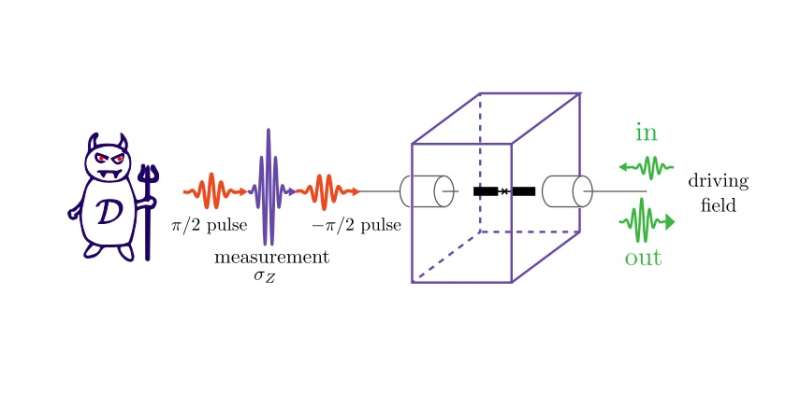July 10, 2017 feature
Maxwell's demon extracts work from quantum measurement

(Phys.org)—Physicists have proposed a new type of Maxwell's demon—the hypothetical agent that extracts work from a system by decreasing the system's entropy—in which the demon can extract work just by making a measurement, by taking advantage of quantum fluctuations and quantum superposition.
The team of Alexia Auffèves at CNRS and Université Grenoble Alpes have published a paper on the new Maxwell's demon in a recent issue of Physical Review Letters.
"In the classical world, thermodynamics teaches us how to extract energy from thermal fluctuations induced on a large system (such as a gas or water) by coupling it to a hot source," Auffèves told Phys.org. "In the quantum world, the systems are small, and they can fluctuate—even if they are not hot, but simply because they are measured. In our paper, we show that it is possible to extract energy from these genuinely quantum fluctuations, induced by quantum measurement."
In the years since James Clerk Maxwell proposed the first demon around 1870, many other versions have been theoretically and experimentally investigated. Most recently, physicists have begun investigating Maxwell's demons that operate in the quantum regime, which could one day have implications for quantum information technologies.
Most quantum versions of the demon have a couple things in common: They are thermally driven by a heat bath, and the demon makes measurements to extract information only. The measurements do not actually extract any work, but rather the information gained by the measurements allows the demon to act on the system so that energy is always extracted from the cycle.
The new Maxwell's demon differs from previous versions in that there is no heat bath—the demon is not thermally driven, but measurement-driven. Also, the measurements have multiple purposes: They not only extract information about the state of the system, but they are also the "fuel" for extracting work from the system. This is because, when the demon performs a measurement on a qubit in the proposed system, the measurement projects the qubit from one state into a superposition of states, which provides energy to the qubit simply due to the measurement process. In their paper, the physicists proposed an experiment in which projective quantum non-demolition measurements can be performed with light pulses repeated every 70 nanoseconds or so.
Since recent experiments have already demonstrated the possibility of performing measurements at such high frequencies, the physicists expect that the new Maxwell's demon could be readily implemented using existing technology. In the future, they also plan to investigate potential applications for quantum computing.
"This engine is a perfect proof of concept evidencing that quantum measurement has some energetic footprint," Auffèves said. "Now I would like to reverse the game and use this effect to estimate the energetic cost of quantum tasks, if they are performed in the presence of some measuring entity. This is the case in a quantum computer, which is continuously 'measured' by its surroundings. This effect is called decoherence and is the biggest enemy of quantum computation. Our work provides tools to estimate the energy needed to counteract it."
More information: Cyril Elouard et al. "Extracting Work from Quantum Measurement in Maxwell's Demon Engines." Physical Review Letters. DOI: 10.1103/PhysRevLett.118.260603, Also at arXiv:1702.01917 [quant-ph]
Journal information: Physical Review Letters
© 2017 Phys.org




















